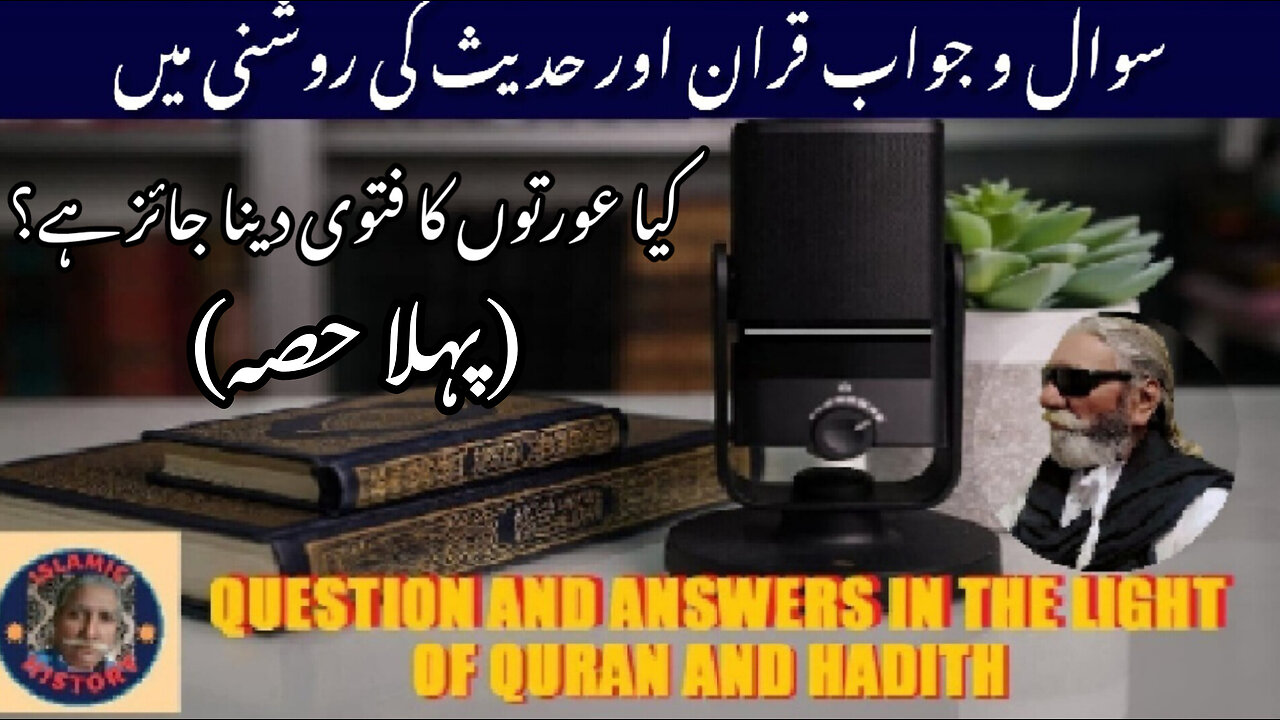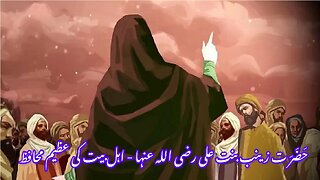Premium Only Content

Part-1 | Is it valid for women to issue fatwa?
@islamichistory813 #FatwaDebate #WomenScholars #IslamicLaw
Part-1 Is it valid for women to issue fatwas?
Asslamoalaikum sisters brothers friends and elders, will be described answer into two parts of the controversial topic of women issuing fatwas in this thought-provoking islamic informative and educational video. Gain insight into the diverse viewpoints surrounding this issue and learn about the historical context that shapes these discussions. so please be with us upto both parts of answer.
Allah, may He be exalted, sent His Messenger with guidance and the religion of truth, to be a bringer of glad tidings and a warner to all people. The Prophet (blessings and peace of Allah be upon him) fulfilled the trust and conveyed the message. Among those who heard him (blessings and peace of Allah be upon him) were both women and men. So those who undertook the mission of conveying and teaching Islam were the Sahaabah and those who came after them; their students included both women and men, and the process of learning and teaching was done in accordance with Islamic guidelines, far removed from any haraam mixing, or women uncovering their faces, or speaking softly.
Islam does not differentiate between men and women with regard to knowledge and issuing fatwas. The scholars have stipulated the conditions to be met by the mufti (scholar who issues fatwas), and they did not mention among these conditions that the mufti must be male. No difference of scholarly opinion is known concerning that.
An-Nawawi (may Allah have mercy on him) said:
The conditions to be met by the mufti are that he should be accountable, Muslim, trustworthy, honest, far removed from evildoing and from actions that could cast aspersions on his [or her] integrity, have an innate ability to grasp the meanings of things, be clear-minded and mature in thinking, of sound understanding and able to reach sound conclusions, and alert. This applies equally to one who is free, a slave, a woman, one who is blind, and one who is nonverbal, if he or she can write or his or her gestures can be understood. End quote. Al-Majmoo‘ Sharh al-Muhadhdhab (1/41).
Among this great ummah there were women who undertook the duty of teaching and issuing fatwas, just as men did.
Yes, the number of women cannot be compared to that of men, because of the nature of man, but this does not mean that there were not women who undertook the mission of teaching and issuing fatwas. Foremost among those women was the Mother of the Believers ‘Aa’ishah (may Allah be pleased with her). Both men and women would seek her out to ask for fatwas, because she had been so close to the Prophet (blessings and peace of Allah be upon him), and because of her intelligence and smartness.
Ibn ‘Abd al-Barr said in al-Isti‘aab (p. 609):
It was narrated that Masrooq said: I saw some of the elderly senior companions of the Messenger of Allah (blessings and peace of Allah be upon him) asking her about issues pertaining to the shares of inheritance.
‘Ata’ ibn Abi Rabaah said: ‘Aa’ishah was the most knowledgeable of the people and had the greatest understanding of religion.
Hishaam ibn ‘Urwah said, narrating from his father: I never saw anyone who was more knowledgeable of fiqh, medicine or poetry than ‘Aa’ishah.
Az-Zuhri said: If the knowledge of ‘Aa’ishah was compared to the knowledge of all the other wives of the Prophet (blessings and peace of Allah be upon him) and the knowledge of all women put together, the knowledge of ‘Aa’ishah would surpass them all. End quote.
Ibn al-Qayyim (may Allah have mercy on him) listed those of the Sahaabah who issued many fatwas, among whom he mentioned ‘Aa’ishah (may Allah be pleased with her). He listed Umm Salamah (may Allah be pleased with her) as one of those who issued a middling number of fatwas; and he listed Umm ‘Atiyyah, Safiyyah the Mother of the Believers, Hafsah and Umm Habeebah as being among those who issued a small number of fatwas.
See: I‘laam al-Muwaqqi‘een (1/12, 13).
We will list in next video some of the women whom Imam adh-Dhahabi (may Allah have mercy on him) described as having knowledge and understanding of religion in his book Siyar A‘laam an-Nubala’. Allah Hafiz
==================================
-
 13:31
13:31
ISLAMIC HISTORY
15 hours agoZaynab bint Ali (RA) Defender of Ahl al Bayt زینب بنت علی رضی اللہ عنہا - اہل بیت کی عظیم محافظ
7 -
 16:07
16:07
Ken LaCorte: Elephants in Rooms
12 hours ago $1.32 earnedWhy firefighting got political
6.67K3 -
 8:31
8:31
Rethinking the Dollar
16 hours agoBitcoin Secrets Nobody Talks About!
3.94K5 -
 2:36:47
2:36:47
DLDAfterDark
6 hours ago $1.63 earnedIs The Left Recruiting To KILL Conservatives? Hey Fascist, CATCH!
5.63K1 -
 22:53
22:53
Jasmin Laine
1 day agoParliament ERUPTS After "WORST Decision EVER!"—Carney Left SPEECHLESS by SHOCKING Report
33.1K74 -
 11:50
11:50
Mrgunsngear
1 day ago $9.36 earnedSteiner MPS Enclosed Red Dot: Better Than The ACRO P2? 🔴
34.1K17 -
 1:27:55
1:27:55
Sarah Westall
1 day agoSelecting World Leaders: Intelligence No Longer a Prerequisite w/ Martin Armstrong
42.8K22 -
 2:03:07
2:03:07
Badlands Media
1 day agoDevolution Power Hour Ep. 393: Synthetic Reality, and the RICO Grande Strategy
74.3K26 -
 11:23:18
11:23:18
GritsGG
13 hours agoQuad Win Streaks!🫡 Most Wins in WORLD! 3600+
82K10 -
 41:16
41:16
MattMorseTV
8 hours ago $93.39 earned🔴Antifa is PREPARING for WAR.🔴
79K436